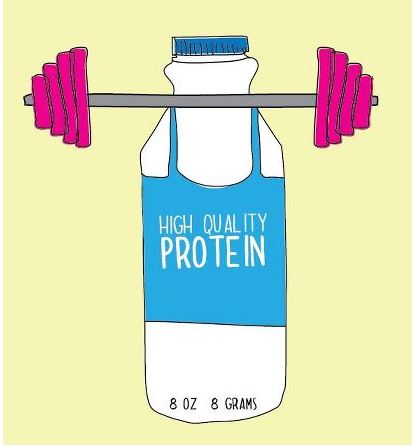Food myths can lead to the omission of important nutrients in the diet. That’s why it’s so important to get the facts about the foods you love- like dairy!
Don’t let all the misinformation out there get the best of you! We’ve identified a few common milk myths that we’d like to clear up. Got another food-ism you want fact checked? Leave a comment and I’ll put my dietitian skills to work! In the meantime, please enjoy the following milk myth busters:
Myth: Drinking milk leads to weight gain.
Busted: The 2010 Dietary Guidelines for Americans recommend enjoying three servings of dairy every day as part of a balanced diet for optimal health. Stay healthy and pour one more glass of low-fat or fat-free milk! For information about weight management, visit ChooseMyPlate.gov. Get more info about dairy as part of a healthy diet at New England Dairy & Food Council.

Myth: Organic milk is healthier than regular milk.
Busted: There is no conclusive evidence that organic milk is superior to regular milk in food safety or nutrition. Organic milk and regular milk both contain nine essential nutrients that make dairy an important part of a healthy diet. So whether you choose conventional or organic, you’re doing the body good by choosing milk! Want to know more? Check out this blog post.

Myth: People with lactose intolerance should avoid dairy.
Busted: Those who are lactose intolerant don’t have to miss out on the great taste and health benefits of dairy. Different people can handle different amounts of lactose, and there’s a solution to meet most needs in the dairy case – from lactose-free milk to dairy foods that are typically easier to digest like hard cheeses and yogurt. National Dairy Council offers great resources and information on how people living with lactose intolerance can still enjoy dairy! Learn more.

Myth: Soy beverages are nutritionally equivalent to milk.
Busted: Soy beverages contain a different set of nutrients than cow’s milk. Although the protein and fat content are similar, soy beverages are naturally low in calcium, containing only about 10 mg per serving. Manufacturers often fortify with calcium, but the amount added is not regulated and can vary from 80 to 500 mg per serving. The other nutrients in milk important for bone health—including vitamin D, phosphorus, potassium and magnesium—are also not present at the same levels in soy beverages. Therefore, soy beverages should not be considered a substitute to the nutrients obtained from milk.

